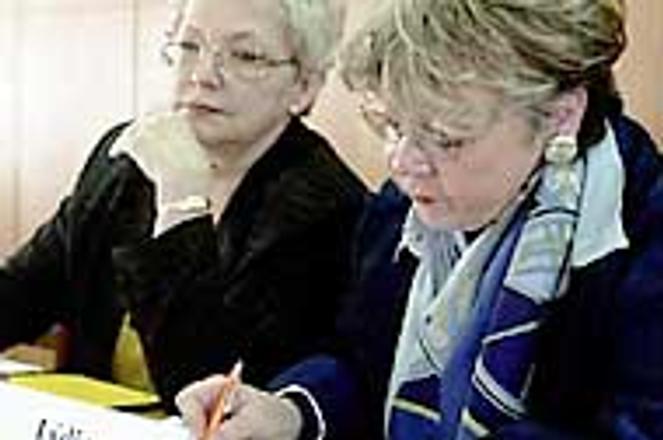THE ´WOMEN'S Parliament', an apolitical advocacy group formed in 2001, has been as close as many women get to politics.photo: TASR
AGRICULTURE Minister Pavol Koncoš, who said two years ago that "a woman, like a piece of land, belongs to the man who ploughs her", has been awarded a mock diploma by women's rights groups for "winning the hearts of Slovak women".
The rights groups - the Choice Opportunity and Slovak Women's Alliance NGOs and the Aspekt feminist magazine - awarded Koncoš and the Christian Democrats political party for what they considered persistent anti-women positions during the Dzurinda government's four year reign.
The NGOs said the gentler sex was thankful that especially Koncoš had tried to introduce order into their lives, as women secretly longed to be somebody's private property.
"Please let us remain close to you and your land so that you can work on both of us at once. You'll save a lot of time," reads the text on Koncoš' diploma.
The irony is not intended to be gentle. NGOs say that the position of women in Slovak society has not improved under the Dzurinda administration, and that given the make-up of political parties participating in the September 20-21 elections, its not likely to be bettered under the next government either.
An NGO study called Women's Voices has shown that Slovak political parties remain ignorant of women's concerns, and that the new parliament arising from elections may have even fewer female members (MPs) than past assemblies.
In what feminist organisations say is a conservative and prejudiced Slovakia, women are still perceived as unsuited to hold public office. Moreover, Slovak women themselves have only recently started to object to the patriarchal society they live in.
"If a woman political party leader makes mistakes, people say she's embarrassing all women, but when an unskilled male politician leads a party, he's not perceived as putting shame on all men," said Jana Juránová, editor-in-chief of Aspekt.
Of the handful of female politicians likely to be elected to the next parliament, one confirmed that she had experienced prejudice.
"I've experienced it several times. Many people simply doubt that a decent lady can be involved in politics," Zuzana Martináková, vice-chair of the Slovak Democratic and Christian Union (SDKÚ) party, told The Slovak Spectator.
Juránová said she believed the widespread prejudice, along with women's general ignorance of their rights, was a result of the country's communist past.
"In Slovakia and in central Europe as a whole we did not experience the [Western] women's movement of the 1960s and 1970s," said Juránová.
One of the Women's Voices surveys suggested that 70 per cent of Slovak women were unhappy with their political representation in parliament. At the same time, the study found that parties were virtually ignoring women's issues in their election programmes.
"Not even the one Slovak party which is led by a woman, Anna Malíková's Slovak National Party [SNS], gives space to women's issues," said Katarína Farkašová, head of the Alliance of Slovak Women.
Although women are dissatisfied with treatment by political parties, the representation of women in politics is expected to remain low.
The 1998-2002 parliament contained 21 female MPs, or 14 per cent of the 150 legislators, unchanged from the previous 1994-1998 term. The Women's Voices study, however, predicts that even fewer female MPs will take seats in the coming four-year period.
The problem is that while more women are running for elections - 22.9 per cent of candidates this year vs 16.9 per cent in 1998 - most of them are unlikely to be elected to parliament because they are low on party lists.
Those who are running are also not portrayed as equal partners of their male colleagues. A study by the Košice-based Prospecta NGO of the role of women in the election campaign found that Slovak political parties had used their female colleagues as background decoration rather than promoting them as serious political professionals.
Ľuba Králová, a sociologist with Prospecta, said that in campaign ads, women had served "either as background or as tools to aid the emotional and intellectual manipulation of the voter".
According to Daniela Baranová, the head of the Association of Female Judges of Slovakia and the author of the Prospecta study, the demeaning portrayal of women reflected an overall unconcern with women's issues in party election programmes.
"The [far-right non-parliamentary] Real Slovak National Party devoted a few words to maternity leave, while [left-wing non-parliamentary] Smer gave one sentence to the victims of domestic violence," she said. "But that was about it."
Martináková said that while her party and others had prepared a women's issues agenda, "the vast majority of these issues did not make it into the election programme, because when designing it we tried to concentrate on the priorities."
Women's issues, she said, are "not issues that political parties consider among the country's most important needs".
The three women's issues NGOs that awarded Koncoš for his boorish statement also singled out the Christian Democrats (KDH) party for special criticism.
In four years in government, the KDH proposed that abortions be outlawed, blocked debate of a new anti-discrimination law in parliament, and opposed a draft law banning discrimination based on sexual orientation.
Katarína Farkašová of the Slovak Women's Alliance ironically applauded the Christian Democrats for their "persistent input into the fight against discrimination of basic women's rights".
While doubting that Slovak women would receive better treatment overnight, Prospecta director Ľubica Mandovičová said she hoped her political gender study "will be a lesson for political parties in the next general elections."


